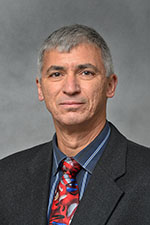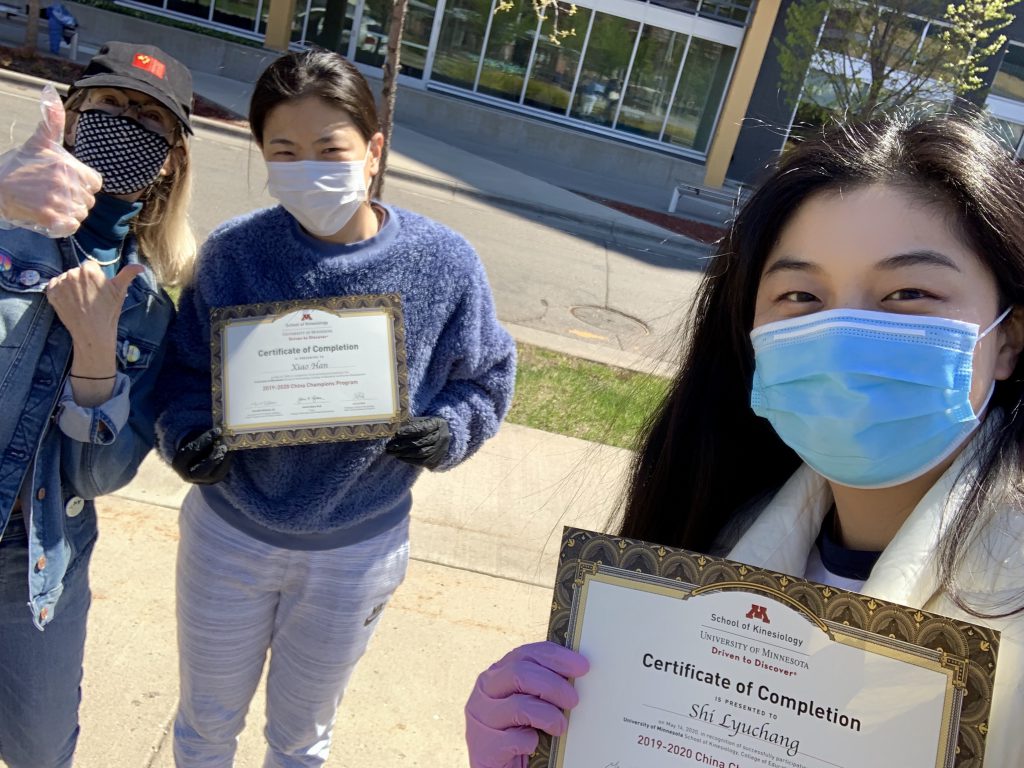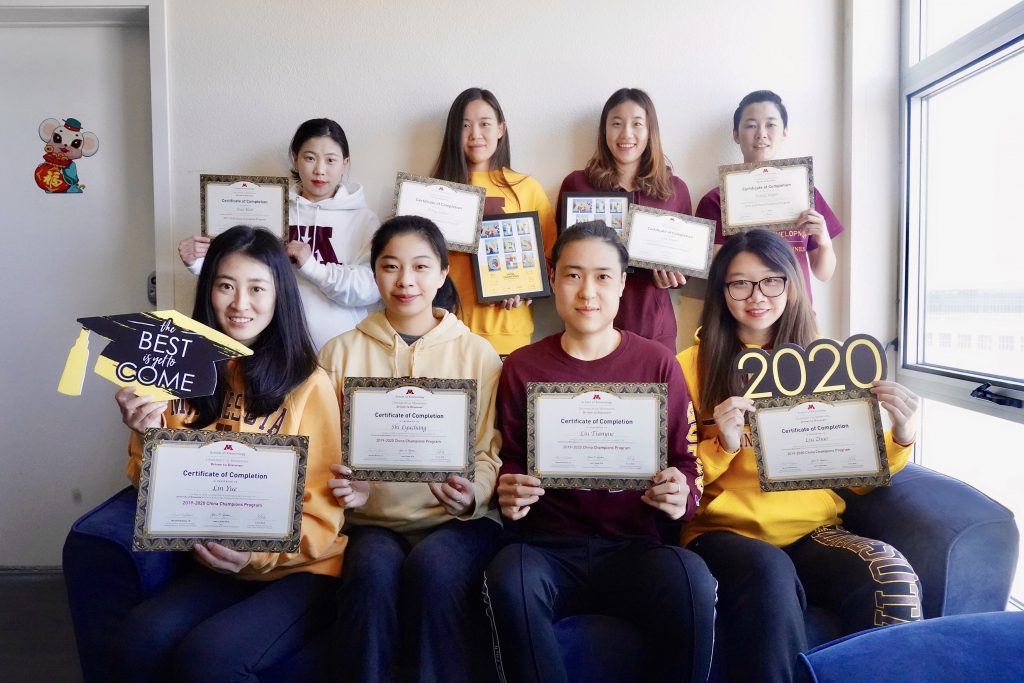Beth Lewis, PhD, Director of the School of Kinesiology, recently shared her expertise with CNN Health as part of their story, How to enjoy working out if you hate exercise. “The key to maintaining exercise is to find an exercise routine that you enjoy, whether it is alone or with people; outside, at home or at a gym,” says Lewis, a professor of Behavioral Aspects of Physical Activity. “Exercise is important not only because of the many health benefits but it also improves mood, positively impacts sleep, and increases energy levels throughout the day,” adds Lewis.
Stoffregen PLOS ONE article research featured on Jeopardy game show!
Postural sway research by Thomas Stoffregen, Ph.D., professor and director of the Affordance Perception-Action Laboratory (APAL) in the School of Kinesiology, was featured November 2 in the popular television game show Jeopardy! Stoffregen and his colleagues (Fuch-Chen Chen, Manuel Varlet, Christina Alcantara, Benoit Bardy) published the groundbreaking article “Getting your sea legs,” in PLOS ONE in June of 2013. With over 7,400 views (10.4% downloaded), the article has enjoyed an uptick in citations in the last two years, now totaling 60 overall citations. The article’s citation rate is a full 11 times higher than the average.
Antunovic Shares Insights on Paralympics, Media Coverage and Gender Stereotypes
Dunja Antunovic, PhD, assistant professor of sport sociology in the School of Kinesiology, recently spoke at a virtual webinar panel, Sports Media Coverage of Elite Female Athletes with Disabilities, organized by WomenSport International, a research-based advocacy organization for girls and women in sport.
Antunovic’s portion of the panel, The Relationship between the Media and the Paralympics, addressed patterns of women’s sports coverage during the Paralympic Games and shared recommendations for improving journalism practice. As part of her work, Antunovic synthesized research findings that illustrate the ways in which coverage of the Paralympics reinforces problematic gender patterns and stereotypical representations that undermine the athletic accomplishments of women with disabilities.
Panelists also included Becky Clark, PhD, a three-time Deaflympics medalist and global deaf and disability sport consultant, and Toni Bruce, PhD, professor of sports media and sport sociology at the University of Auckland, New Zealand.
Empirical data indicates the volume of media coverage is increasing, but athletes are represented differently depending on nationality and gender. The panelists also discussed recommendations as to how language, visual imagery, and production decisions can improve coverage of elite sportswomen with disabilities.
Lu Receives New Researcher Award
Landy Lu, PhD, sport management assistant professor in the School of Kinesiology, has received the European Association of Sport Management (EASM) New Researcher Award for her study, “Relational Pluralism, Organizational Status, and the Adoption of Collegiate eSport Programs in the U.S.”
Lu’s research focuses on an interesting collegiate-level organizational change around eSports in the United States. Between 2014 and 2020, more than 170 universities/colleges launched varsity eSports programs. Her study examines how relational ties (e.g., athletic associations, athletic conferences, and state community settings) shape the adoption of eSports programs and how organizational status (e.g., ranking) moderates this relational influence.
The study’s findings indicate that an athletic association’s position around eSports influences member schools’ decisions whether to adopt. Results also show that universities are likely influenced by peers in the same athletic conference when it comes to eSports adoption. Once the number of local peer schools reaches a critical mass, universities with a higher ranking are more likely to adopt. The universities/colleges included in Lu’s story are affiliated with the National Association of Collegiate Esports (NACE), the predominant collegiate eSports association in the U.S.
Lu presented her research and received her award virtually at the EASM Festival of Sport Management Research and Practice on September 16, 2021.
Kinesiology’s Sanchez to serve as associate journal editor
Otto Sanchez, PhD, exercise physiology lecturer in the School of Kinesiology, has been invited to serve as an associate editor for the Frontiers in Cardiovascular Medicine journal’s section on Cardiovascular Epidemiology and Prevention. Sanchez is a biomedical researcher with expertise in analyzing data, presenting findings, contributing to peer-reviewed journals, and educating on human physiology and the benefits of exercise to health.
Gao publishes on exercise intervention for breast cancer patients
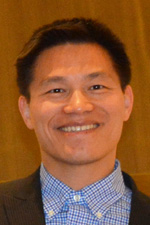
Zan Gao, PhD, kinesiology associate professor and director of the Physical Activity Epidemiology Laboratory (PAEL), published an article, “A Longitudinal Study of a Multicomponent Exercise Intervention with Remote Guidance among Breast Cancer Patients,” in the International Journal of Environmental Research and Public Health.
The study examined the effectiveness of a 12-week multicomponent exercise with remote guidance intervention on health-related outcomes after one year among breast cancer patients. A total of 60 patients with breast cancer who completed chemotherapy/postoperative radiotherapy within the previous four months to two years were randomly assigned to either the multicomponent exercise with remote guidance group or usual care.
Eligible participants were approached to assess cancer-related quality of life, muscle strength, cardiorespiratory endurance, and physical activity barriers after one year. The study found that the multicomponent exercise group observed significant differences from the usual care group in quality of life, muscle strength, cardiopulmonary endurance, and physical activity participation. These results suggest that the phsyical acitivity intervention produces long-term health benefits for breast cancer patients.
2019-20 China Champions athletes graduate from School of Kinesiology
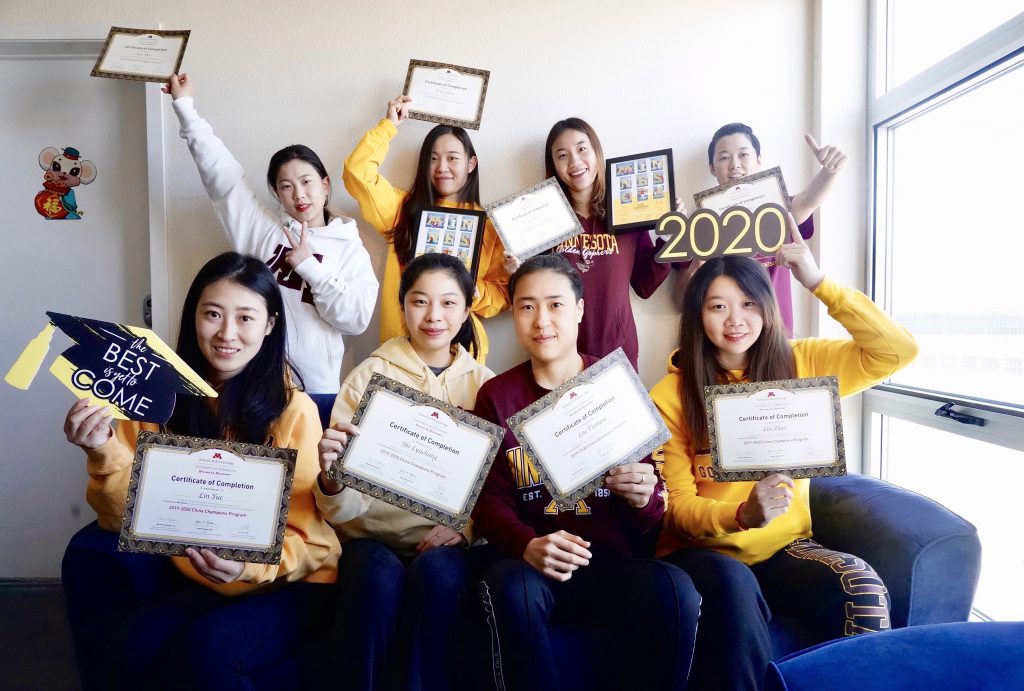
The 2019-2020 class of eight China Champions graduated on May 14, 2020 after spending more than six months with the University of Minnesota. The athlete-scholars enrolled in selective courses in the School of Kinesiology. After being introduced to American collegiate sports, they became enthusiastic Gophers fans and enjoyed much that the Twin Cities has to offer. The China Champions will continue taking classes this summer, before returning to complete their graduate degrees at Beijing Sport University.

Jill Griffiths, director of the China Champions Program (CCP), gave an introductory speech regarding the partnership with Beijing Sport University. “The China Champions Program provides a unique opportunity to bring cultures together and have a shared experience. The CCP supports the University’s international goals: enhancing knowledge and cultural awareness, connecting individuals and organizations, and strengthening our role in a global society.”
President Joan Gabel said to Griffiths, “I would be most grateful if you could extend my sincerest greetings and congratulations to these eight accomplished students and wish them the best in all of their next steps.”

College of Education & Human Development (CEHD) Dean Quam gave the keynote speech and emphasized the impact China Champion athletes had and says, “Can one person make a difference? Clearly each one of you has had a large footprint and made a difference in our lives.”
Program leaders such as Beth Lewis, PhD, School of Kinesiology professor and director, and Meredith McQuaid, associate vice president and dean of the Global Programs and Strategy Alliance, also congratulated the China Champions.
Read more about this year’s China Champions cohort here. Watch the full graduation ceremony recording here (password: 7H^39U5c).
Gao publishes on effects of physical activity app-integration
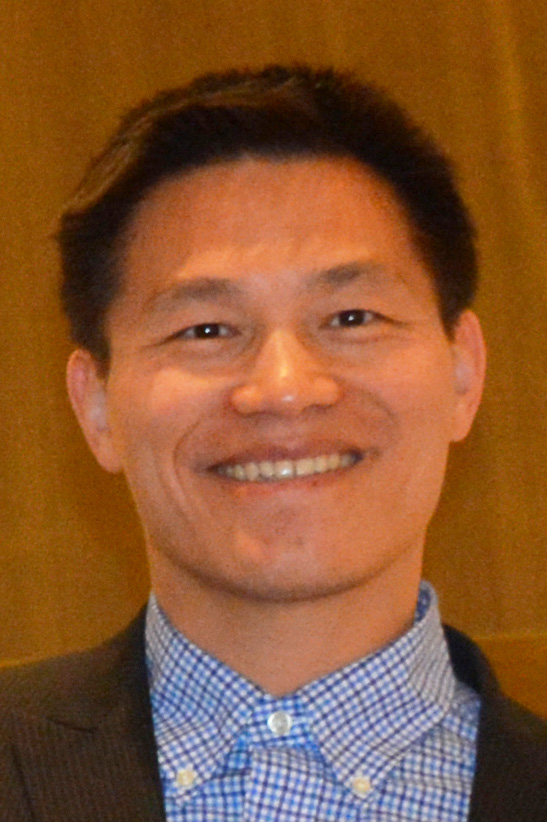
Zan Gao, PhD, associate professor in the School of Kinesiology and director of the Physical Activity Epidemiology Laboratory (PAEL), published a research article, “Effects of the iPad and mobile application-integrated physical education on children’s physical activity and psychosocial beliefs,” in the Journal of Physical Education and Sport Pedagogy as a co-author. The primary author is Dr. Gao’s former doctoral student, Jung Eun Lee, an associate professor in the Department of Applied Human Sciences at the University of Minnesota-Duluth.
In the research study, a total of 157 fourth and fifth grade children were recruited from two elementary schools in Minneapolis, MN. The two-week app-integrated physical education classes were ineffective in reducing children’s sedentary behavior, as well as improving light physical activity (PA), moderate-to-vigorous physical activity, and physical activity-related beliefs. Instructors are recommended to align the use of apps with physical education learning goals. The selection of apps and pedagogy of app-use need to be carefully considered to prevent compromising children’s physical activity for the sake of efficient management or emphasis on other learning domains. According to the study, “it is essential to examine whether app-integrated PE is effective in promoting children’s PA and PA-related psychosocial beliefs such as enjoyment and self-efficacy.”
Mahnan presents two papers at the design of medical device conference
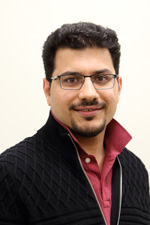
Arash Mahnan, PhD candidate in the School of Kinesiology, presented two research papers to the virtual 2020 Design of Medical Device Conference (DMD2020). Mahnan is also a graduate researcher in the the Human Sensorimotor Control Laboratory (HSCL).
The first presentation, “A new system to objectively measure ankle proprioception,” describes a developed medical device that has the potential to become a tool for clinicians to identify proprioceptive impairment at the ankle and measure the efficacy of sensorimotor interventions for balance. This paper has been selected as one of the top ten contributed papers in the DMD2020 conference that describes medical devices with commercial potential. Mahnan will compete in the Three-in-Five Competition’s live Zoom event on May 19, 2020. Co-authors of the publication include Jessica Holst-Wolf, PhD, postdoctoral associate, and Jürgen Konczak, PhD., kinesiology professor and director of the HSCL.
Mahnan also presented “Real-time voice activity detection using neck-mounted accelerometers for controlling a wearable vibration device to treat speech impairment,” which was a collaboration between Mahnan, Saurav Dubey, former lab member in HSCL, and Dr. Konczak.
- A NEW SYSTEM TO OBJECTIVELY MEASURE ANKLE PROPRIOCEPTION
2. REAL-TIME VOICE ACTIVITY DETECTION USING NECK-MOUNTED ACCELEROMETERS FOR CONTROLLING A WEARABLE VIBRATION DEVICE TO TREAT SPEECH IMPAIRMENT
Gao publishes on active video games fighting childhood obesity

Zan Gao, PhD, associate professor in the School of Kinesiology and director of the Physical Activity Epidemiology Laboratory (PAEL), published a review article, “A systematic review of active video games on youth’s body composition and physical activity,” in the International Journal of Sports Medicine.
The study found that, overall, active video games show positive effects in improving body composition and physical activity in overweight/obese youth. The publication concludes active video games are deemed promising to promote exercise and reduce childhood obesity.
Konczak gives virtual address at NSDA symposium

Jürgen Konczak, PhD, director of the Human Sensorimotor Control Laboratory (HSCL), gave an invited presentation to the 30th Research Symposium of the National Spasmodic Dysphonia Association (NSDA) on May 2. Konczak’s presentation highlighted recent research on a new non-invasive treatment to reduce voice symptoms of individuals with spasmodic dysphonia. Due to the COVID-19 pandemic, the symposium was entirely virtual. Arash Mahnan, doctoral student in the School of Kinesiology and HSCL research member, and Dr. Konczak addressed questions about the laboratory’s research on spasmodic dysphonia in a Q&A session with over 100 attending from across the United States.
HSCL receives award to develop vibro-tactile stimulation technology for laryngeal dystonia

The Human Sensorimotor Control Laboratory (HSCL), under Jürgen Konczak, Ph.D., movement neuroscience and biomechanics professor in the School of Kinesiology, received a $50,000 grant from the National Spasmodic Dysphonia Association (NSDA). The award will allow the HSCL to further develop non-invasive neuromodulation technology, which uses small vibrators attached to the skin above the voice box to stimulate laryngeal mechanoreceptors. Initial results from an ongoing clinical trial funded through the National Institutes of Health (NIH) showed that over 65% of patients received short-term benefits and were able to reduce vocal symptoms. Laryngeal dystonia, also referred to as spasmodic dysphonia (SD), is a rare disorder that leads to unwanted spasms in the laryngeal musculature involved in speech production. SD creates communication barriers, and there currently is no cure for the disease.
Dengel publishes on body composition in NCAA division I track & field athletes
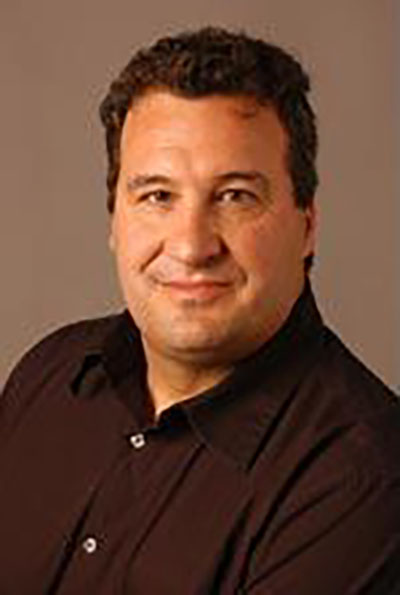
Donald R. Dengel, PhD, exercise physiology professor in the School of Kinesiology and director of the Laboratory of Integrative Human Physiology (LIHP), is the lead author of an article, “Body composition and bone mineral density of division 1 collegiate track and field athletes, a consortium of college athlete research (C-CAR) study,” in the Journal of Clinical Densitometry.
The publication examines body composition using dual X-ray absorptiometry (DXA) in 590 male and female NCAA Division I collegiate track and field athletes, making it the largest study of its kind. The number of athlete participants allowed researchers to analyze data by position. The study found that there were both sex- and event-specific total and regional body composition measurements differences in these collegiate athletes, which can be used by coaches and sports performance staff to determine collegiate track and field athletes’ positional suitability. Additionally, it informs more effective training and nutritional programs.
Co-authors include Tyler Bosch, PhD, and Kat Keller, BS, kinesiology alumni.
Kihl publishes on athletic social responsibility and donations

Lisa A. Kihl, PhD, associate professor in the School of Kinesiology and director of the Global Institute for Responsible Sport Organizations, recently published an article, “Corporate social responsibility and college sports fans’ online donations,” in the International Journal of Sports Marketing and Sponsorship. The research examines how college athletic departments’ corporate social responsibility (CSR) initiatives influence online donations from fans within the United States.
Co-authors of the article include alumna Dr. Guemchan Hwang and colleague Dr. Yuhei Inoue, former sport management faculty member in the School.
Evanoff and Dengel publish research on fetal aorta characteristics

Nicholas Evanoff, MS, doctoral student in the School of Kinesiology and member of the the Laboratory of Integrative Human Physiology (LIHP), is the lead author of an article, “Assessing vascular characteristics of the fetal descending aorta: a feasibility study,” in the Journal of Clinical Ultrasound.
The publication analyzes the feasibility measuring vascular characteristics of the descending abdominal aorta in the fetuses of pregnant mothers. The research study found that it is possible to measure vascular characteristics in the fetus in utero. The study also indicates that diabetic mothers’ fetuses may have different abdominal aorta vascular mechanics in comparison to fetuses of non-diabetic mothers.

Co-authors include Donald R. Dengel, PhD, professor in the School of Kinesiology and director of LIHP.
Raymond-Pope studies body composition of NCAA basketball players
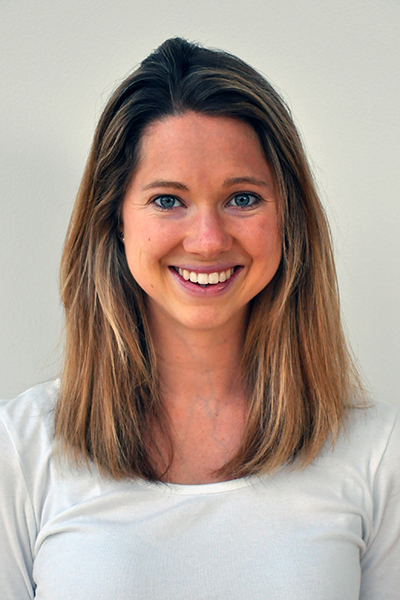
Christiana Raymond-Pope, PhD, postdoctoral fellow in the School of Kinesiology’s Skeletal Muscle Plasticity and Regeneration Laboratory, is the lead author of the article, “Total and regional body composition of NCAA division I collegiate basketball athletes,” in the International Journal of Sports Medicine.
This study examines body composition using dual X-ray absorptiometry (DXA) in 210 male and female NCAA Division I collegiate basketball athletes, making it the largest study of its kind so far. The number of athletes allows evaluation by position, and the research found that there were both sex- and position-specific total and regional body composition measurement differences in collegiate basketball players. The data can be used by coaches and sport performance staff to create more effective training and nutritional programs for athletes.
Dr. Raymond-Pope graduated from the School with her MS and PhD in the focus area of exercise physiology. Co-authors of the article include Donald R. Dengel, PhD, professor in the School of Kinesiology and director of the Laboratory of Integrative Human Physiology, Tyler Bosch, PhD, and Anna Solfest, kinesiology alumni.
Evanoff publishes on brain function with MRI

Nick Evanoff, MS, doctoral student in the School of Kinesiology, is the lead author of an article, “Reproducibility of a ramping protocol to measure cerebral vascular reactivity using functional magnetic resonance imaging,” in the Journal of Clinical Physiology and Functional Imaging.
The publication examines the reproducibility of a new method to evaluate function in brain blood vessels using magnetic resonance imaging (MRI) and linear changes in CO2. The results of this study found that this MRI method could be used by both clinicians and researchers to examine cerebral pathophysiology in a new and dynamic way.

Donald R. Dengel, PhD, professor in the School of Kinesiology and director of the Laboratory of Integrative Human Physiology (LIHP), is a co-author of the article.
Greising publishes on musculoskeletal system injury response

Sarah M Greising, PhD, assistant professor in the School of Kinesiology and director of the Skeletal Muscle Plasticity and Regeneration Laboratory (SMPRL), published an article, “Musculoskeletal Regeneration, Rehabilitation, and Plasticity Following Traumatic Injury,” in the International Journal of Sports Medicine. The review highlights the broad and collective research impact on sport and traumatic orthopedic injuries in search of promoting ongoing innovation for treatment, as well as the rehabilitation approaches aimed to improve musculoskeletal health throughout life.
Co-authors of the article include Drs. Jarrod Call and Benjamin Corona, from the University of Georgia and Wake Forest University respectively.
Gopher basketball asst coach Roysland’s work from home schedule
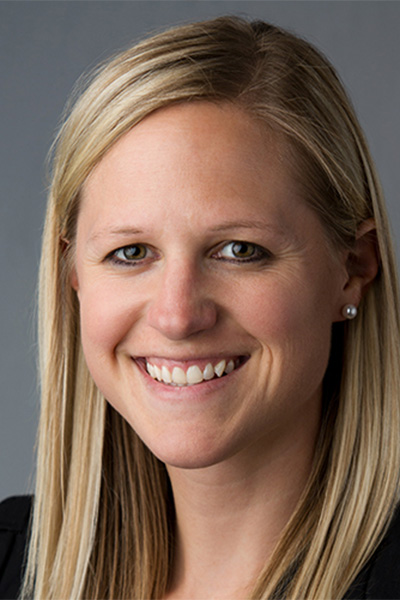
Kelly Roysland, School of Kinesiology alumna in Sport Management (BS, 2007) and Kinesiology (MEd, 2009), was featured in a WCCO article, “With Basketball Paused, Kelly Roysland & Eric Curry Embrace Family Time.”
As a former Gopher Women’s Basketball athlete from 2004-2007 and player on the Gopher’s only Final Four team, Roysland understands the excitement of March Madness. Currently, Roysland is the assistant coach for the Gopher Women’s Basketball team.
Stoffregen presents on cybersickness at WISP

School of Kinesiology professor, and director of the Affordance Perception-Action Laboratory, Thomas Stoffregen PhD, gave the keynote presentation, “Cybersickness: The method and the movement,” at the Workshop on Immersive Sickness Prevention (WISP). The WISP meeting was held virtually.
The second annual workshop was held in tandem with the IEEE Conference on Virtual Reality and 3D User Interfaces on March 22, 2020.






